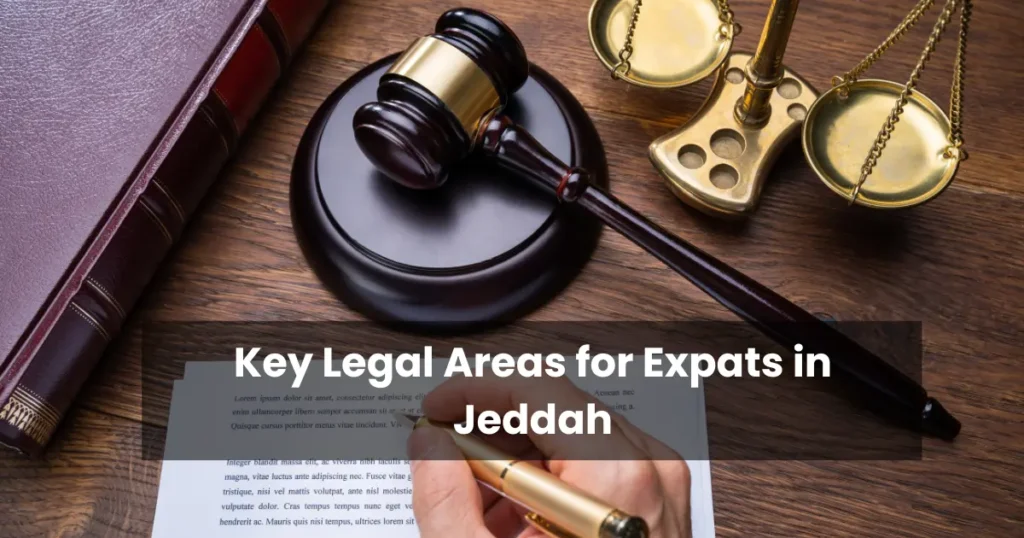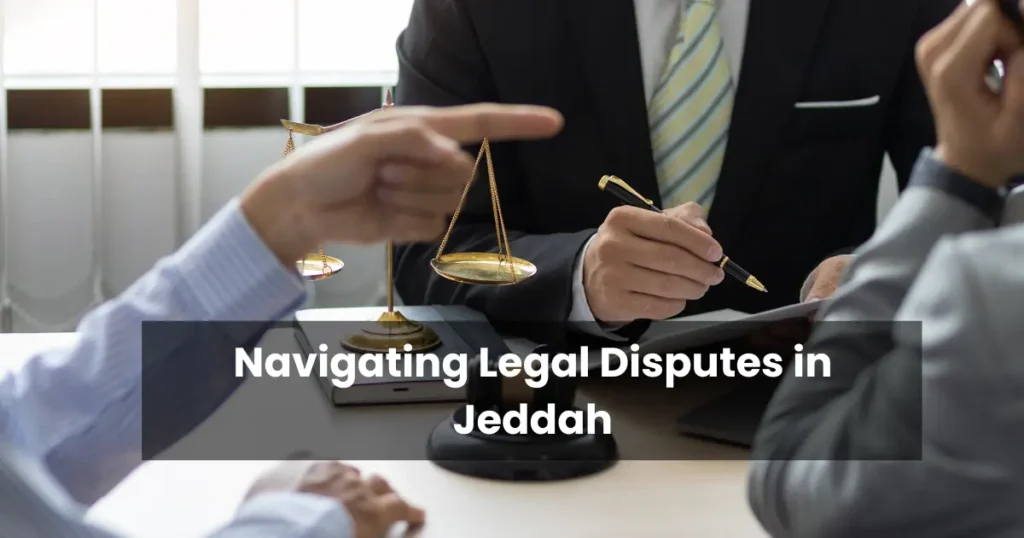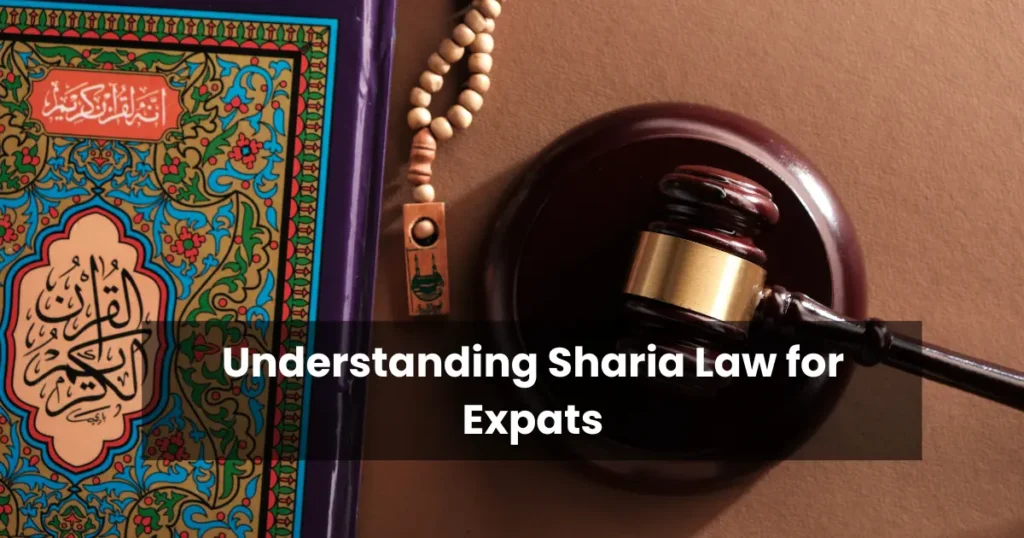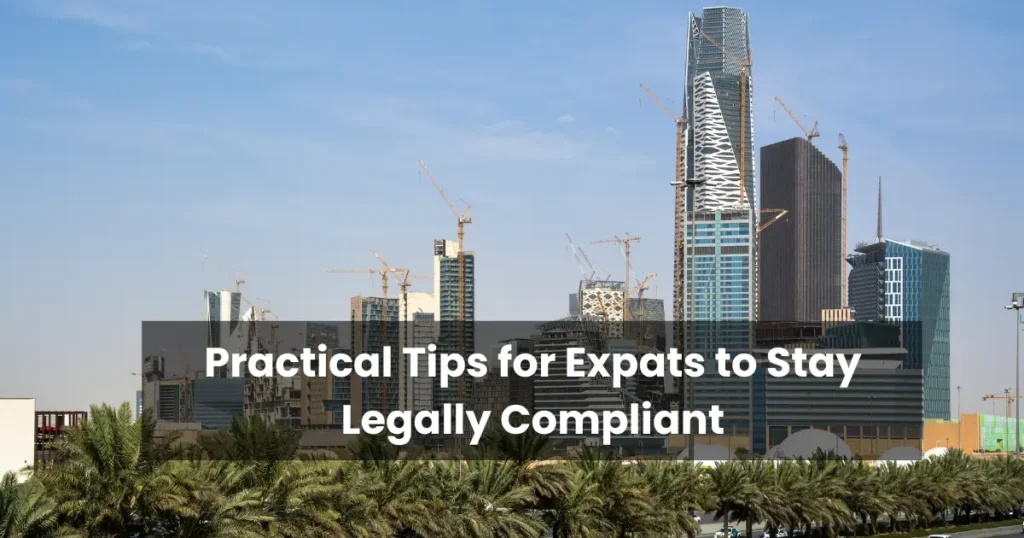Legal Advice for Expats in Jeddah | Expat problems when living in KSA (2025)
Jeddah, one of Saudi Arabia’s most dynamic cities, attracts thousands of expatriates every year due to its thriving economy, cultural diversity, and opportunities in various industries. While the city offers expats a unique lifestyle, navigating the legal system can be complex and challenging. For expats unfamiliar with Saudi Arabia’s laws and regulations—many of which are rooted in Sharia law—seeking legal advice for expats in Jeddah becomes crucial.
1.1 Overview of the Expats’ Legal Landscape in Saudi Arabia
Saudi Arabia operates under a unique legal framework that combines Sharia law with specific governmental regulations. This framework governs everything from visa requirements and employment contracts to family law and property ownership. Expats in Jeddah often face challenges such as understanding their rights under Saudi law, adhering to labor laws, and resolving disputes in areas like tenancy, business partnerships, and inheritance.
Language barriers, cultural differences, and the complexity of the legal system can create hurdles for expats attempting to resolve legal issues independently. Missteps or a lack of awareness about local laws can lead to financial losses, strained relationships, or even legal penalties.
1.2 Importance of Seeking Professional Legal Advice
Given the intricacies of the legal system, seeking legal advice for expats in Jeddah is not only beneficial but essential for ensuring compliance and safeguarding one’s rights. Professional legal advisors familiar with both local and international laws can help expats navigate issues like visa renewal, employment disputes, or tenancy agreements effectively.
At Dr. Abdulrahman Baamir Law Firm, we specialize in providing expert legal advice tailored to the unique needs of expats. Our team ensures that clients understand their legal rights and obligations, helping them resolve issues efficiently while minimizing risks.
Whether you’re moving to Jeddah for work, starting a business, or managing personal matters, partnering with a trusted law firm can make a significant difference in protecting your interests and maintaining peace of mind.
Key Legal Areas for Expats in Jeddah
Navigating life in Jeddah as an expatriate involves dealing with various legal matters, many of which differ significantly from those in other countries. Whether it’s obtaining a visa, understanding employment contracts, or resolving family disputes, being aware of the key legal areas is essential for avoiding complications. Seeking legal advice for expats in Jeddah can help ensure compliance and protect your rights.

2.1 Visa and Residency Permits
One of the most critical legal aspects for expats in Jeddah is securing the proper visa and residency permits (Iqama). The Kingdom of Saudi Arabia has strict immigration laws, and overstaying a visa or failing to renew your Iqama can lead to severe penalties, including fines and deportation. Expats often require guidance on the renewal process, sponsorship regulations, and changes in visa status if they switch employers.
2.2 Employment Laws and Contracts
Understanding employment laws in Saudi Arabia is crucial for expats working in Jeddah. Employment contracts must comply with the Saudi Labor Law, which regulates issues like working hours, end-of-service benefits, and termination procedures. Disputes over unfair dismissal, unpaid salaries, or contract violations are common challenges faced by expats.
2.3 Housing and Tenancy Agreements
For expats renting properties in Jeddah, understanding tenancy laws is essential. Landlord-tenant disputes often arise due to issues like unclear lease terms, rental increases, or withheld security deposits. Saudi tenancy laws aim to protect tenants, but expats may need legal advice to resolve disputes or negotiate favorable lease agreements.
2.4 Business Setup for Expats
Expats interested in starting a business in Jeddah must navigate a complex process involving licensing, foreign ownership laws, and compliance with Saudi regulations. While recent reforms have made it easier for foreigners to invest and establish businesses, it’s crucial to understand the legal requirements and choose the right business structure.
2.5 Family and Personal Law (Marriage, Divorce, and Custody)
Family law in Saudi Arabia is governed by Sharia law, and it plays a significant role in matters such as marriage, divorce, and child custody. Expats may face challenges in resolving family disputes, particularly when cultural and legal differences come into play. For instance, divorce proceedings and custody arrangements are heavily influenced by Islamic principles.
2.6 Inheritance and Property Rights
Inheritance laws in Saudi Arabia are also rooted in Sharia law and can be complex for expats. Issues such as property ownership, inheritance distribution, and disputes among heirs require legal guidance to ensure compliance with local laws. Expats should take proactive steps to draft wills and resolve inheritance matters efficiently.
By addressing these key areas with the help of legal advice for expats in Jeddah, you can minimize risks and legal challenges while enjoying a smooth experience in the city. For personalized guidance, the Dr. Abdulrahman Baamir Law Firm is here to assist you in navigating these legal complexities with professionalism and expertise.
Navigating Legal Disputes in Jeddah
Legal disputes are an inevitable part of life for many expats in Jeddah, whether they arise in the workplace, housing, or personal relationships. While Saudi Arabia provides a robust legal framework for resolving disputes, the process can be intimidating for expats unfamiliar with the legal system. Seeking legal advice for expats in Jeddah is key to resolving disputes efficiently and protecting your rights.

3.1 Common Disputes Faced by Expats
Expats in Jeddah often encounter disputes in several areas:
- Employment Disputes: Issues such as wrongful termination, unpaid salaries, or violations of employment contracts are common.
- Tenancy Disputes: Expats may face conflicts over rental increases, maintenance responsibilities, or withheld security deposits.
- Business Disputes: For expat entrepreneurs, disagreements with local partners or licensing authorities can lead to legal complications.
- Family Disputes: Matters involving divorce, child custody, or inheritance are often challenging due to differences in cultural and legal practices.
Understanding the nature of these disputes and the proper channels for resolution can significantly impact their outcomes.
3.2 The Role of Mediation in Resolving Disputes
Mediation is a preferred method for resolving disputes in Saudi Arabia. It is often faster, less expensive, and less adversarial than going to court. Many disputes, particularly in employment and tenancy matters, are first referred to mediation through government-appointed bodies or private mediators.
Benefits of Mediation:
- Avoids prolonged litigation
- Provides a platform for both parties to reach a mutually agreeable solution
- Maintains confidentiality and preserves relationships
Expats are encouraged to seek legal advice for expats in Jeddah to navigate mediation sessions and advocate for their best interests.
3.3 When to Take Legal Action
While mediation can resolve many disputes, there are instances where taking legal action is necessary:
- When mediation fails to produce a fair outcome
- In cases of severe contract violations or non-compliance with court rulings
- When urgent injunctions or enforcement of rights are required
Legal proceedings in Jeddah are conducted in Arabic, and expats must work with a qualified legal representative who can provide translation services and represent their interests in court.
Steps to Take Legal Action in Jeddah:
- Seek Legal Advice: Consult a qualified attorney to understand your rights and options.
- File a Complaint: Submit a formal complaint to the relevant authority or court.
- Gather Evidence: Collect all necessary documents, contracts, and correspondence to support your case.
- Attend Court Hearings: Appear in court with your legal representative to present your case.
Why Professional Legal Support Matters
Navigating disputes in Jeddah without professional assistance can lead to unnecessary delays and unfavorable outcomes. A knowledgeable attorney familiar with Saudi laws can guide you through mediation, arbitration, or litigation, ensuring your rights are protected at every step.
At Dr. Abdulrahman Baamir Law Firm, we specialize in providing expats with personalized legal solutions. Our team has extensive experience handling disputes in employment, tenancy, business, and family matters. With our expertise, we can help you resolve disputes efficiently while minimizing stress and uncertainty.
By understanding the available dispute resolution mechanisms and partnering with a trusted legal firm, expats in Jeddah can effectively navigate legal challenges and secure favorable outcomes. For expert guidance, contact Dr. Abdulrahman Baamir Law Firm today.
Understanding Sharia Law for Expats
Sharia law forms the foundation of Saudi Arabia‘s legal system, influencing all aspects of life, including civil, criminal, and personal matters. For expats in Jeddah, understanding the basics of Sharia law is essential for navigating legal issues effectively. While the principles of Sharia may differ from the legal systems in other countries, seeking legal advice for expats in Jeddah can help bridge the gap between cultural and legal expectations.

4.1 Key Aspects of Sharia Law in Saudi Arabia
Sharia law is derived from the Quran and Hadith (teachings of Prophet Muhammad) and governs both public and private conduct. Some key aspects of Sharia law that expats should be aware of include:
- Personal Status Laws: These cover marriage, divorce, child custody, and inheritance, with rulings based on Islamic principles.
- Criminal Law: Punishments for crimes such as theft or fraud can differ significantly from those in Western legal systems.
- Commercial Law: Business dealings, contracts, and financial transactions must comply with Islamic guidelines, such as the prohibition of interest (riba).
- Moral Conduct: Public behavior, dress codes, and social interactions are governed by Islamic principles. Violations can result in legal penalties.
While these aspects may seem complex, legal experts familiar with Sharia law can help expats understand and comply with these regulations.
4.2 How Sharia Law Affects Expats
Sharia law applies to both citizens and expatriates living in Saudi Arabia. However, some areas may have different implications for expats:
- Family Law:
- Marriage and divorce for expats must align with Saudi legal requirements. Interfaith marriages and custody disputes are particularly sensitive issues.
- Inheritance laws follow Islamic principles, which may differ from the inheritance laws in an expat’s home country.
- Employment Disputes:
- Expats working in Jeddah are protected by Saudi labor laws, which align with Sharia principles. For example, wages must be paid on time, and employees cannot be arbitrarily terminated.
- Property and Business Ownership:
- Ownership of property by expats is restricted, and business operations must comply with Islamic commercial laws. Legal guidance is essential when drafting contracts or forming partnerships.
- Criminal Law:
- While some laws are universally applied, such as theft or assault, others, like public behavior and dress codes, may be unfamiliar to expats. Violating these laws, even unintentionally, can result in fines or other penalties.
Navigating Sharia Law as an Expat
Understanding Sharia law is crucial for expats to ensure compliance and avoid legal complications. Here are a few practical tips:
- Be Informed: Take the time to learn about Saudi laws and cultural expectations, particularly in areas like family law, employment, and public conduct.
- Work with Experts: Seek legal advice for expats in Jeddah from professionals who are well-versed in Sharia law and can help you navigate legal complexities.
- Stay Proactive: Keep all legal documentation up to date, including residency permits, contracts, and wills.
At Dr. Abdulrahman Baamir Law Firm, we specialize in helping expats understand and navigate Sharia law. Whether you’re dealing with family disputes, property ownership, or business matters, our team provides expert legal advice tailored to your unique needs.
By understanding the core principles of Sharia law and working with knowledgeable legal professionals, expats in Jeddah can protect their rights and avoid unnecessary legal challenges. For personalized assistance, contact Dr. Abdulrahman Baamir Law Firm—your trusted partner in navigating Saudi Arabia’s legal landscape.
Practical Tips for Expats to Stay Legally Compliant
Living and working in Jeddah as an expat can be a rewarding experience, but staying legally compliant is crucial to avoid unnecessary complications. Saudi Arabia has strict laws and regulations, and understanding these is essential for expats to maintain a smooth and trouble-free stay. By following these practical tips and seeking legal advice for expats in Jeddah, you can ensure compliance with local laws.

5.1 Understand Local Laws and Customs
Saudi Arabia’s legal system is deeply rooted in Sharia law, which governs both public and private behavior. Expats should familiarize themselves with key areas such as:
- Public Conduct: Adhere to modest dress codes and avoid public displays of affection.
- Cultural Sensitivities: Be respectful of local customs, particularly during religious observances like Ramadan.
- Legal Restrictions: Avoid prohibited activities such as alcohol consumption, gambling, and possession of certain media.
5.2 Keep Your Legal Documents Up to Date
Expats in Jeddah must maintain valid documentation, including:
- Iqama (Residency Permit): Always carry your iqama and renew it promptly before expiration.
- Work Contracts: Ensure your employment contract is legally compliant and aligned with Saudi labor laws.
- Travel Documents: Keep your passport and visas updated and avoid overstaying.
Failure to keep these documents in order can result in fines, deportation, or legal complications.
5.3 Stay Informed About Employment Rights
If you are working in Jeddah, it is vital to know your rights under Saudi labor laws. These include:
- Timely payment of wages
- Proper working hours and overtime compensation
- Access to end-of-service benefits upon contract termination
Should disputes arise with your employer, seek legal advice for expats in Jeddah to resolve the matter professionally.
5.4 Respect Saudi Business Regulations
Expats involved in business or entrepreneurship should comply with the following:
- Registering businesses with the Ministry of Commerce
- Following guidelines for joint ventures with local partners
- Ensuring all contracts comply with Sharia principles, including the prohibition of interest (riba)
Legal professionals can assist expats in drafting compliant contracts and navigating the regulatory framework.
5.5 Protect Yourself in Personal and Family Matters
For expats dealing with family issues such as marriage, divorce, or child custody, it is essential to understand how Sharia law applies to these matters. Expats are encouraged to:
- Register marriages with local authorities to ensure legal recognition
- Draft wills in accordance with Saudi inheritance laws
- Seek legal guidance during divorce or custody proceedings
5.6 Address Disputes Proactively
Disputes can arise in employment, tenancy, or personal relationships. To stay legally compliant:
- Resolve disputes through mediation whenever possible
- File complaints with the appropriate authorities when necessary
- Consult an experienced attorney to ensure your rights are protected
5.7 Work With Trusted Legal Professionals
Navigating the complexities of Saudi law can be challenging for expats. Partnering with a trusted law firm ensures that you remain compliant with local regulations while safeguarding your rights.
At Dr. Abdulrahman Baamir Law Firm, we specialize in providing comprehensive legal advice for expats in Jeddah. Our experienced attorneys can help you with residency issues, employment disputes, family law matters, and more.
By following these practical tips and relying on expert legal support, expats in Jeddah can ensure compliance with Saudi laws while enjoying a fulfilling experience. For personalized legal assistance, contact Dr. Abdulrahman Baamir Law Firm—your trusted partner for all legal matters in Saudi Arabia.
Conclusion
Living as an expat in Jeddah can be an enriching experience, but navigating the complexities of Saudi Arabia’s legal system requires careful attention and understanding. From employment disputes to family law matters and business compliance, expats must stay informed about local laws and Sharia principles to avoid legal complications. Seeking professional guidance ensures that your rights are protected while you adapt to a new legal and cultural environment.
At Dr. Abdulrahman Baamir Law Firm, we specialize in providing expert legal advice for expats in Jeddah. Whether you need assistance with residency issues, business contracts, family disputes, or navigating Sharia law, our team is here to guide you every step of the way. With a deep understanding of Saudi law and a commitment to client success, we are your trusted partner in ensuring a secure and legally compliant stay in Jeddah. Contact us today to receive personalized legal solutions tailored to your unique needs.
